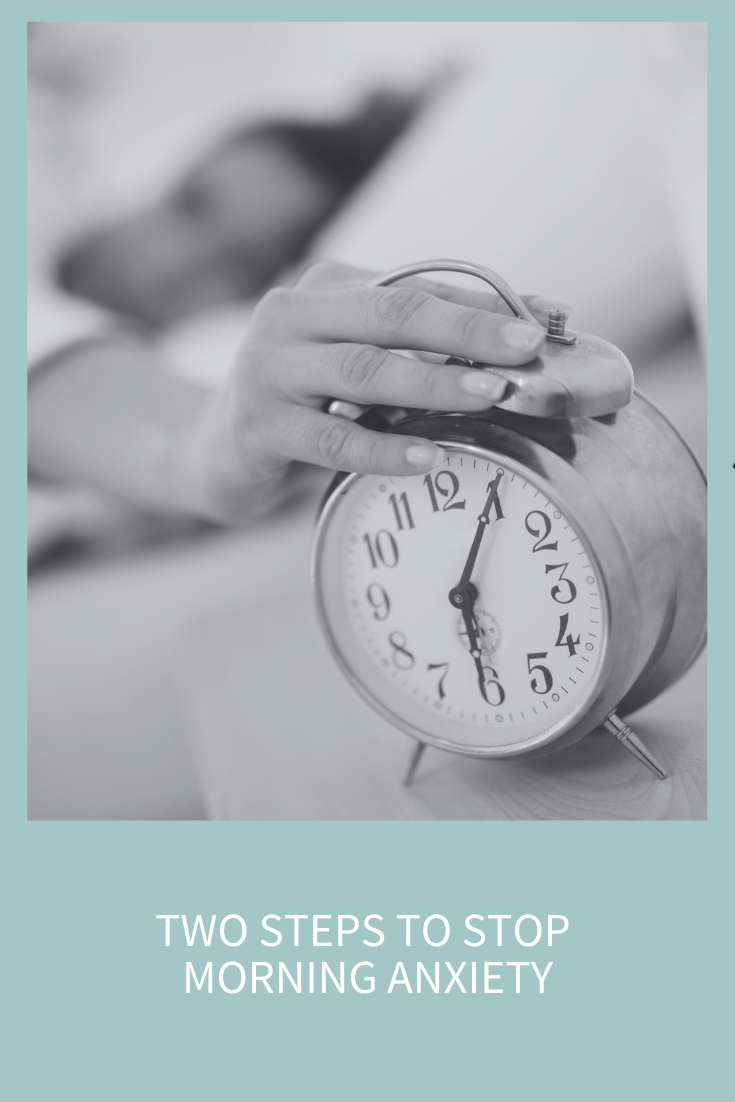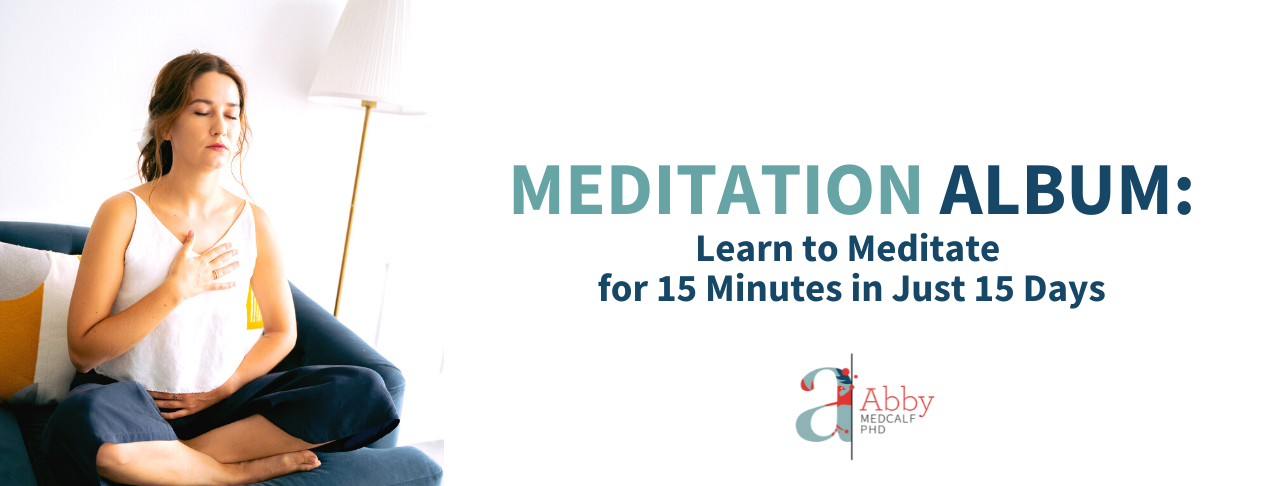
Do you open your eyes in the morning and your first thoughts are negative, or you notice a feeling of dread or worry lurking about? Well, you’re not alone. Morning anxiety is actually a relatively common experience and, believe it or not, it’s not just in your head. Yup. Your biology is against you too. Today you’ll learn why you have morning anxiety and my two clear steps to make it stop.
6-minute read
Introduction
Morning dread, or morning anxiety, is a phenomenon where you wake up feeling anxious, uneasy or fearful about the upcoming day. My clients have been mentioning this issue to me for years, and I’m always amazed that they don’t realize how common and “natural” it is.
Biological Reasons for Morning Anxiety
There are three main biological reasons you wake up feeling a little anxious.
Bio Reason #1: The Cortisol Awakening Response (CAR)
I’ve talked about cortisol many times on the podcast because it’s one of your main stress hormones. Although you release cortisol any time you’re stressed, your cortisol increases significantly within the first 30-45 minutes after you wake up. This little surge is a normal physiological response meant to prepare your body for the day ahead but can cause heightened anxiety if you’ve got any kind of anxiety disorder.
Bio Reason #2: Those Damn Hormones
You’ve also got hormonal changes that happen throughout the night (and not just females experience this – you men have hormones too!), and these can be another reason you wake up feeling uneasy. For example, melatonin, the hormone responsible for regulating sleep, decreases in the morning, while those other hormones, like adrenaline and cortisol, increase. When this kind of hormonal shift happens, you can get a spike in alertness and, consequently, anxiety.
Bio Reason #3: You’ve got a Sleep Disorder
Poor sleep quality or sleep disorders like insomnia can also exacerbate morning anxiety. Lack of restorative sleep can lead to an imbalance in those stress hormones, leaving you more susceptible to anxiety when you wake up in the morning.
Psychological Reasons for Morning Anxiety
As if it wasn’t enough that your biology can work against you in the mornings, there are also some psychological reasons for that morning dread you’re feeling.
Psych Reason #1: Anticipatory Anxiety
You might also be experiencing something commonly called anticipatory anxiety, where the fear of the unknown or the stress of upcoming events causes significant anxiety. This can be especially pronounced in the morning as you start to think about your day’s tasks and responsibilities (especially with the help of those stress hormones).
Psych Reason #2: Negative Thought Patterns
When you first wake up, you’re often groggy and not fully in charge of your faculties yet. If you’ve already got an issue with any negative thought patterns, such as catastrophizing (expecting the worst possible outcome) or all-or-nothing thinking, morning dread can grab you before you even fully wake up. This is a negative habit of thought you have during the day that needs to change so you can wake up better.
Get my five steps to stop (or at least greatly minimize) ruminating and repetitive negative thinking.
Psych Reason #3: Your Life is Sucking Right Now
Sometimes, that morning dread is because you’ve got some high level of stress from some personal, professional, or social circumstance that’s giving you persistent anxiety all day long. When that’s happening, that anxiety will generally manifest very strongly in the mornings. Maybe your relationship is blowing up, you’ve got worries about work, you’ve got a health issue going on, or your taxes are due and you don’t have the money to pay. Whatever it is, it can be creating a general feeling of anxiety all day long and, in the mornings when your defenses are down, it’s at its worst.
Two Clear Steps to Managing Morning Anxiety
Step #1: Prepare Today for a Better Tomorrow
Prevention is your best friend when it comes to reducing or eliminating morning anxiety. There are a few things you can do.
1. Reducing the intake of caffeine, sugar, alcohol and other mood altering substances, especially late in the day, will definitely improve your sleep quality and reduce morning anxiety. Additionally, maintaining a regular sleep schedule, ensuring a restful sleep environment, and practicing good sleep hygiene are crucial.
2. Planning and organizing your tasks for the next day the night before can also reduce morning anxiety. By setting priorities and having a clear plan, you can wake up with a sense of direction and reduced stress about what needs to be accomplished.
3. Limit exposure to news and social media. Avoiding negative news and limiting time on social media at night can prevent additional stress and anxiety when you wake up. Read a book, listen to music, have a laugh with your partner or best friend or have a walk before bed instead of sitting for hours on your phone.
4. Practice mindfulness and meditate daily.
Step #2: Start with Positive Momentum
The very best thing you can do is to get in charge of your thoughts immediately. Morning anxiety is a habit of thought, so you need a new habit to replace it the minute you open your eyes. You need a “I just woke up” morning ritual to get ahead of the negativity. The first thing to note is that you cannot (I repeat, you cannot) hit the snooze button. You can’t stop morning anxiety or dread by hitting the snooze over and over. Instead, do the following:
Step 1: When you turn off the alarm (or when you awake naturally), take a moment in bed to bring yourself to a good feeling thought. It could be your soft sheets, your partner’s warm back or the seashells you collected last vacation that are sitting on your shelf. Now, take one deep breath with a long, slow exhale.
Step 2: Sit up and plant your feet on the floor and set an intention for how you’d like the next little section of your morning to be. Take one or two breaths and focus on whatever good thing you want to feel.
Step 3: You can now get out of bed and move forward with your day. If you have it in you, I’d love for you to listen to my Good Morning Visualization to really put your head in an excellent direction. It’s under four minutes, and it’ll make a big difference.
Try my five-step morning routine to start your day right.
Research and Resources to Stop Morning Anxiety
Abby’s Step-by-Step Guide to Starting Your Day Right
Why Sleep is The Secret to Great Relationships
Good Morning Guided Meditation (Start Your Day with Ease and Connection)
Five Steps to Stop Ruminating and Repetitive Negative Thinking
How to Make Mindfulness a Consistent Habit
How Meditation Benefits Your Relationships and There’s an Easy Way to Learn







